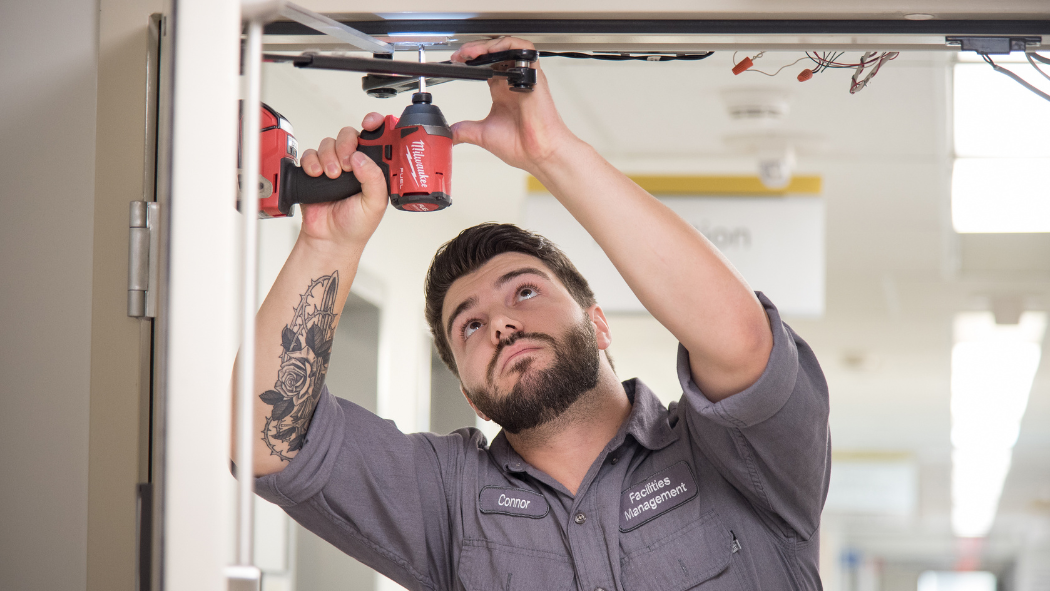
Connor Belanger, a locksmith in the Facilities department at LHSC uses a drill to adjust the mechanism on a door, ensuring it works safely for patients and staff.
September 16, 2025
London Health Sciences Centre (LHSC)’s Facilities Department is comprised of many tradespeople helping ensure the buildings, and mechanical and electrical operations are safe for patients and staff every day. The people who support the access to spaces throughout the organization are locksmiths. Connor Belanger is one of three locksmiths at LHSC.
Belanger and his colleagues provide on-call support throughout the year to ensure doors and locks work properly, providing essential access to the organization’s secure and public spaces across the city. Helping ensure the buildings are accessible, and patients and staff can access them easily is something he takes pride in.
Before joining the LHSC in 2023, Belanger worked as a locksmith for a small business in St. Thomas for approximately seven years. “I have several family members who work at LHSC, and when there was an opening, I knew I had to apply,” says Belanger.
What does patient safety mean to you?
An important part of his role is keeping vulnerable patients safe. There are a lot of secured units at LHSC, including paediatric patients, mental health patients and areas that need to be secure as well such as pharmacy, and offices. “It's my job to keep it that way. There's a lot of codes, a lot of locks, a lot of keys,” says Belanger “All those doors, codes and keys need to be tracked and we are held to a certain standard.”
The other important aspect is ensuring people can access the spaces they need to. The doors themselves have a lot of wires and components to ensure accessibility.
"Every person has a right to access any part of the hospital as they should and these doors need to be accessible,” explains Belanger. “There are various aspects to the door’s operation including time delay, speed, and strength that need to be adjusted.”
How do you impact patient safety?
“Once a month, we have to change the codes on multiple units because the level of patients arriving and leaving every day,” explains Belanger. The codes, such as those manually entered into a keypad need to be updated frequently to maintain secure access to those units, such as ones with vulnerable or paediatric patients.
Doors with swipe card locks are supported by a subcontractor, however Belanger and his colleagues work closely with them. Secured spaces are an integral part of the hospital keeping patients, staff and information secure. Many of the doors also tie into the fire alarm system as well. “We have a lot of high-tech locks in place just to keep those who need to be secured,” explains Belanger. “It’s several teams working together.”
While Belanger doesn’t work directly with patients in his role, he does occasionally get asked for directions. “It’s nice to be able to help people get to where they need to be,” he says. “It's a nice little part of my day where I feel like I can help someone out face-to-face.”
How many doors has he worked on in just over a year?
“Whether you're going through it or just looking at it, I've touched it,” he says smiling.
Patient Safety at LHSC video (October 2024):
Other features in the series:
- Patient Safety in Laboratory Medicine
- Patient Safety in Housekeeping
- Patient Safety in Research
- Infection Prevention and Control keeps patients safe throughout the hospital
- Patient Safety in Medical Device Reprocessing
- Patient Safety in Portering
- Patient Safety in Information and Technology Services
- Patient Safety in Food Services
- Patient Safety in Quality Improvement